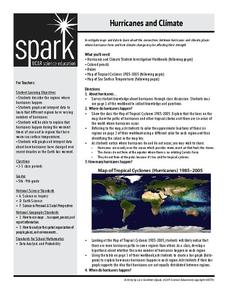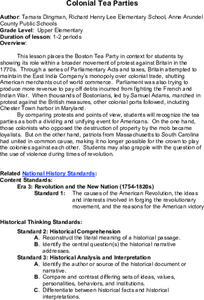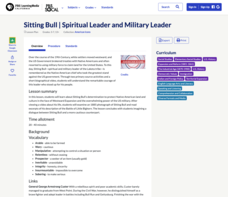Cornell University
Forensic Science: Case of the Missing Diamond Maker
Someone stole a diamond-making machine. Who done it? Scholars use forensic science at six different stations to determine the culprit. They analyze fingerprints, use their senses, and complete chemistry experiments to determine the...
PBS
Sharing Stories/Compartamos Cuentos
Parents and grandparents have the best stories! Send kids home with this diversity worksheet, asking them to listen to a story from an older family member. Youngsters draw a picture of the story as they hear it, and then tell the class...
Baylor College
Infectious Disease Case Study
Small groups of life science learners look at Allison's symptoms and discuss a diagnosis. They use a chart of illnesses and draw symptom clues from an envelope to determine what illness she has. A lesson like this gives children an...
Center Science Education
Hurricanes and Climate
Feeling under the weather? This lesson on hurricanes can whip things up! With professionally designed maps and handouts, teach your future weathermen (or women) where, when, and how hurricanes occur. They identify hurricane regions and...
Center for History Education
Who Burned the Peggy Stewart?
Not all Patriots were on the same page against the British before the Revolutionary War. While some wanted to use peaceful means, such as debate and petition, others used violence, such as burning ships carrying British tea. Using...
Center for History Education
Colonial Tea Parties
Most people know of the Boston Tea Party, but it was only one of similar protests throughout the colonies. Using a case study from Maryland, learners explore primary sources, including images and newspaper accounts of similar tea...
US Department of Commerce
Featured Activity: City Planning With Census Data
What's more important ... an ice cream store or a police station? How about a school or a hospital? Using a simulation game, pupils allot resources as the federal government would based on the census. Discussion questions round out the...
Roy Rosenzweig Center for History and New Media
American Indians and their Environment
People could take a page in ingenuity and survival from the Powhatans. Deer skins became clothes, and the members of the Native American group farmed the rich Virginia soil and hunted in its forests for food. Using images of artifacts...
PBS
Sitting Bull: Spiritual Leader and Military Leader
Sitting Bull was not expected to be a great warrior. Yet, he led the Lakota people and other tribes to several pivotal victories against the United States government when federal troops threatened their land. Using primary sources, such...
PBS
Cesar Chavez: Labor Leader and Civil Rights Activist
Cesar Chavez believed so much in the cause of farmworkers that he put his money where his mouth was. Chavez quit his well-paying job to organize them into labor unions. Using a speech, photograph, and short biographical video, pupils...
State of Victoria Department of Education and Early Childhood Development
The Long Wall of China
While some aspects of the Great Wall of China are known, other parts of its story are obscured by time. A research lesson asks scholars to consider what we know and don't understand about this wonder of the world. The class then compiles...
Judicial Learning Center
About Federal Judges: Qualifications of Judges
"Help Wanted: A Supreme Court Justice." What should be included in the ad? Learners ponder the question during a lively activity that asks them to examine the qualifications for various federal offices and then create job postings....
Council for Economic Education
Mercantilists and the Midas Touch
What is the connection between greed and mercantilism? Historians consider this question by analyzing a fairy-tale like story about King Midas from the nineteenth century. The background information and excerpt help pupils understand the...
Council for Economic Education
The Columbian Exchange
What did you have for dinner last night? Many scholars ask that question without considering the history behind the foods they eat. Using a simulation, scholars investigate how the foods they eat are the product of the Columbian...
Council for Economic Education
The Economic System of Medieval Europe
How are economics and politics intertwined? Societies in the Medieval period used feudalism for both economic and military reasons. The arrangement provided safety and met other needs. Using the included simulation, individuals...
Council for Economic Education
Economic Systems of the Incas and Aztecs
The Inca and Aztecs created vast economic empires in South America, but how did economics play a role? A simulation activity and reading help scholars evaluate the kinds of markets these great civilizations created. They then consider...
Council for Economic Education
Fall of Rome
What led to the fall of Rome? Scholars have debated the question since the end of the great empire. Young historians consider the same question through an economic lens using an engaging lesson that involves a hands-on evaluation of the...
Council for Economic Education
The Silk Road
The Silk Road connected the European, Middle Eastern, and Asian worlds. It also helped create the modern trade world. An analysis activity makes the importance of this Chinese innovation clear by asking participants to evaluate trades...
Council for Economic Education
The Neolithic Agricultural Revolution
What effect could one person's invention have on the human race? In the case of the Neolithic Agricultural Revolution, small improvements in farming methods led to increased food production. The human population began to boom, leading us...
Council for Economic Education
Out of Africa: Why Early Humans Settled around the World
Why would someone want to leave home? The age-old question is at the center of a thought-provoking activity. Scholars consider why humans move around the world both during pre-historical times and today using a PowerPoint, reading on...
Council for Economic Education
Christopher Columbus, Entrepreneur? Queen Isabella, Venture Capitalist?
What did it take to embark on a journey to unknown lands? Perhaps ambition, but also money! Christopher Columbus had to approach more than one European monarch for financing before he could sail the ocean blue. A read-along play and...
Council for Economic Education
Why Didn't China Discover the New World?
Who was Zheng He and why haven't we heard of him? Scholars consider the question as they compare his vast expeditionary force to that of Christopher Columbus. Young historians then ponder the intersection of science, economics, and...
Council for Economic Education
Wages and the Black Death
While the Black Death wiped out a third of Europe's population during the Middle Ages, its destruction paved the way for better wages for workers and even an early form of modern capitalism. The relationship between the cataclysmic event...
Council for Economic Education
Athens and Sparta-Imagine the Possibilities
Both Athens and Sparta made choices to survive in ancient Greece. Those choices were, in essence, economic ones about how to direct resources. A Venn diagram activity and reading ask class members to examine the connection between...

























